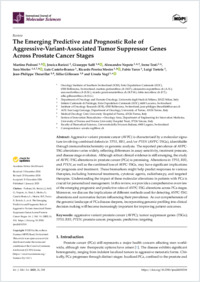The emerging predictive and prognostic role of aggressive-variant-associated tumor suppressor genes across prostate cancer stages
- Pedrani, Martino Oncology Institute of Southern Switzerland (IOSI), Ente Ospedaliero Cantonale (EOC), Bellinzona, Switzerland - Department of Oncology and Hemato-Oncology, Università degli Studi di Milano, Italy
- Barizzi, Jessica Istituto Cantonale di Patologia, Ente Ospedaliero Cantonale (EOC), Locarno, Switzerland
- Salfi, Giuseppe ORCID Oncology Institute of Southern Switzerland (IOSI), Ente Ospedaliero Cantonale (EOC), Bellinzona, Switzerland - Institute of Oncology Research (IOR), Faculty of Biomedical Sciences, Università della Svizzera italiana, Switzerland
- Nepote, Alessandro Oncology Institute of Southern Switzerland (IOSI), Ente Ospedaliero Cantonale (EOC), Bellinzona, Switzerland - Institute of Oncology Research (IOR), Faculty of Biomedical Sciences, Università della Svizzera italiana, Switzerland - AOU San Luigi Gonzaga, Department of Oncology, University of Torino, Italy
- Testi, Irene Oncology Institute of Southern Switzerland (IOSI), Ente Ospedaliero Cantonale (EOC), Bellinzona, Switzerland - Medical Oncology Unit, University Hospital of Parma, Italy
- Merler, Sara ORCID Oncology Institute of Southern Switzerland (IOSI), Ente Ospedaliero Cantonale (EOC), Bellinzona, Switzerland - Institute of Oncology Research (IOR), Faculty of Biomedical Sciences, Università della Svizzera italiana, Switzerland - Section of Innovation Biomedicine—Oncology Area, Department of Engineering for Innovation Medicine, University of Verona and Verona University Hospital Trust, Italy
- Castelo-Branco, Luis Oncology Institute of Southern Switzerland (IOSI), Ente Ospedaliero Cantonale (EOC), Bellinzona, Switzerland
- Pereira Mestre, Ricardo ORCID Oncology Institute of Southern Switzerland (IOSI), Ente Ospedaliero Cantonale (EOC), Bellinzona, Switzerland - Institute of Oncology Research (IOR), Faculty of Biomedical Sciences, Università della Svizzera italiana, Switzerland
- Turco, Fabio Oncology Institute of Southern Switzerland (IOSI), Ente Ospedaliero Cantonale (EOC), Bellinzona, Switzerland
- Tortola, Luigi Oncology Institute of Southern Switzerland (IOSI), Ente Ospedaliero Cantonale (EOC), Bellinzona, Switzerland
- Theurillat, Jean-Philippe ORCID Institute of Oncology Research (IOR), Faculty of Biomedical Sciences, Università della Svizzera italiana, Switzerland
- Gillessen, Silke ORCID Oncology Institute of Southern Switzerland (IOSI), Ente Ospedaliero Cantonale (EOC), Bellinzona, Switzerland - Faculty of Biomedical Sciences, Università della Svizzera italiana, Switzerland
- Vogl, Ursula Oncology Institute of Southern Switzerland (IOSI), Ente Ospedaliero Cantonale (EOC), Bellinzona, Switzerland
- 2025
Published in:
- International journal of molecular sciences. - 2025, vol. 26, no. 1, p. 318
Aggressive variant prostate cancer (AVPC)
Tumor suppressor genes (TSGs)
TP53
RB1
PTEN
Prostate cancer
Prognosis
Predictive
Targeting
English
Aggressive variant prostate cancer (AVPC) is characterized by a molecular signature involving combined defects in TP53, RB1, and/or PTEN (AVPC-TSGs), identifiable through immunohistochemistry or genomic analysis. The reported prevalence of AVPC-TSG alterations varies widely, reflecting differences in assay sensitivity, treatment pressure, and disease stage evolution. Although robust clinical evidence is still emerging, the study of AVPC-TSG alterations in prostate cancer (PCa) is promising. Alterations in TP53, RB1, and PTEN, as well as the combined loss of AVPC-TSGs, may have significant implications for prognosis and treatment. These biomarkers might help predict responses to various therapies, including hormonal treatments, cytotoxic agents, radiotherapy, and targeted therapies. Understanding the impact of these molecular alterations in patients with PCa is crucial for personalized management. In this review, we provide a comprehensive overview of the emerging prognostic and predictive roles of AVPC-TSG alterations across PCa stages. Moreover, we discuss the implications of different methods used for detecting AVPC-TSG alterations and summarize factors influencing their prevalence. As our comprehension of the genomic landscape of PCa disease deepens, incorporating genomic profiling into clinical decision making will become increasingly important for improving patient outcomes.
- Collections
- Language
-
- English
- Classification
- Medicine
- License
- Open access status
- gold
- Identifiers
-
- DOI 10.3390/ijms26010318
- ARK ark:/12658/srd1332076
- Persistent URL
- https://n2t.net/ark:/12658/srd1332076
Statistics
Document views: 80
File downloads:
- Theurillat_2025_MDPI_ijms_The Emerging Predictive: 80
